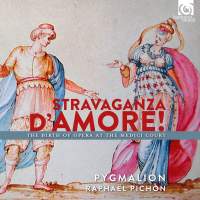Texte paru dans: / Appeared in: |
|
|
Outil de traduction (Très approximatif) |
|
|
Reviewer: Iain Fenlon This two-record set takes as its starting point the various strains of dramatic music that fed into early Florentine opera, above all the legendary and spectacular intermedi put together for the 1589 Medici wedding. Unprecedented in scale and unified by the theme of the power of music, this music is historically important precisely because it is constructed out of the elements from which early opera evolved, within a decade, in the same city. Ten excerpts are presented here, together with substantial sections from Giulio Caccini’s Il rapimento di Cefalo, Marco da Gagliano’s La Dafne and both Caccini’s and Jacopo Peri’s settings of L’Euridice, together with a selection of other works from the period in a variety of styles and forms by a constellation of composers. By grouping them into six imaginary intermedi defined by themes (‘La favola d’Apollo’, ‘Le lagrime d’Orfeo’ and so on), Raphaël Pichon has ingeniously encouraged structured listening across composers and genres of a kind that rarely occurs on record; the results are fascinating and, at times, revelatory.
This is not to
say that all these pieces are masterpieces. Some, such as Malvezzi’s Sinfonia,
were written simply to disguise the creaking of the stage machinery as the sets
were changed. As with so much stage music designed to project a message across
the footlights, many of them originally formed just one element in a complex
experience designed to evoke a sense of ‘wonder’, induced by costumes, lighting,
scenic effects and the music itself, which was intended to stupefy the listeners
through the virtuosity of the performers and the unparalleled size of the forces
required. Pichon and Pygmalion rise to this challenge magnificently. Speeds are
finely judged, the sense of vocal and instrumental ensemble is well balanced and
there is some impressive solo singing, including Luciana Mancini’s carefully
wrought rendition of ‘Lassa, che di spavento’ from Caccini’s L’Euridice.
Elsewhere there is some spectacular improvised instrumental ornamentation (just
occasionally a little exaggerated), while the whole is expertly underpinned by a
rich array of continuo instruments. The fruits of an ambitious and carefully
researched project, these records come encased in a beautifully presented
illustrated hardback book, with three essays and the texts of the vocal works
translated into English, French, and German. |
|




